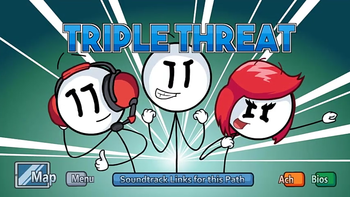I started playing There is No Game with a friend, and she was able to quickly pick up on the a lot of the puzzles, which sometimes meant cutting off the narrator prematurely. This cuts off not only his hints, but also a lot of his dialogue meant to entertain the player. However, the puzzles were completed and we were able to advance the (non)game toward “winning.” However, if a lot of There is No Game‘s charm is in its narrative voice, do you lose if you miss out on those large chunks? In a game that relies so heavily on meta-humor, a lot is lost through winning quickly. (This is similar to The Stanley Parable, where not following the narrator and the “rules” of the game leads to a more interactive and arguably more interesting experience.)
This also reminds me of The Henry Stickmin Collection. If you traditionally win the game, it’s not nearly as entertaining. A lot of the fun and interesting points in the game are through “failing” and not being able to advance, seeing the different ways in which Henry can blow himself up or fail his attempts. Henry Stickmin is also a game that relies heavily on meta-humor through references to several different video games, as well as comics and movies. If you tried to advance completely perfectly, your experience would be less enjoyable, and would need to be supplemented with going back through and finding all the interesting easter eggs, references, and “fail” options.
In what ways do we categorize winning? Is it just completing the game? Getting all of the achievements? Simply surpassing the state we thought we could reach? What about games that have multiple endings? Do we win once we’ve gotten the “good” ending? Or do we have to reach all endings? Are there no “good” endings, like in (non hacking) Save the Date? What about open world games or sandbox games? To what end do our personal thoughts on games inform what we categorize as a win state?

